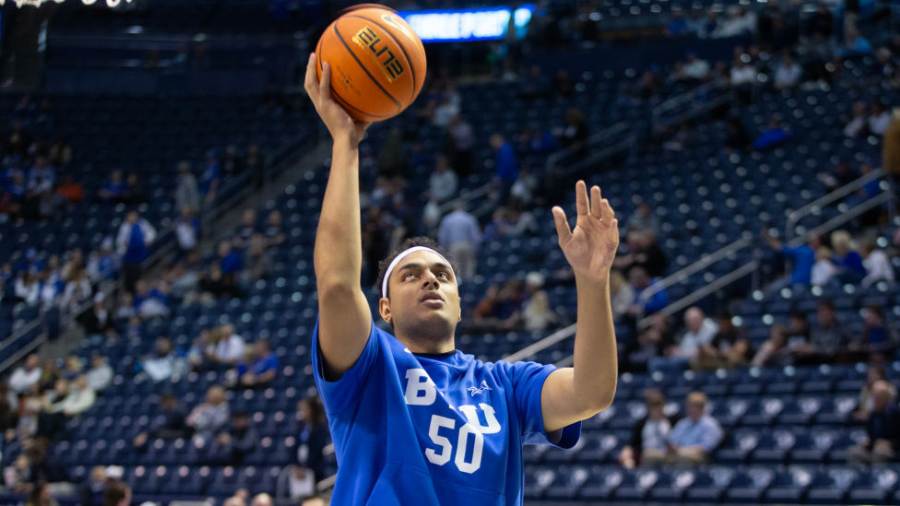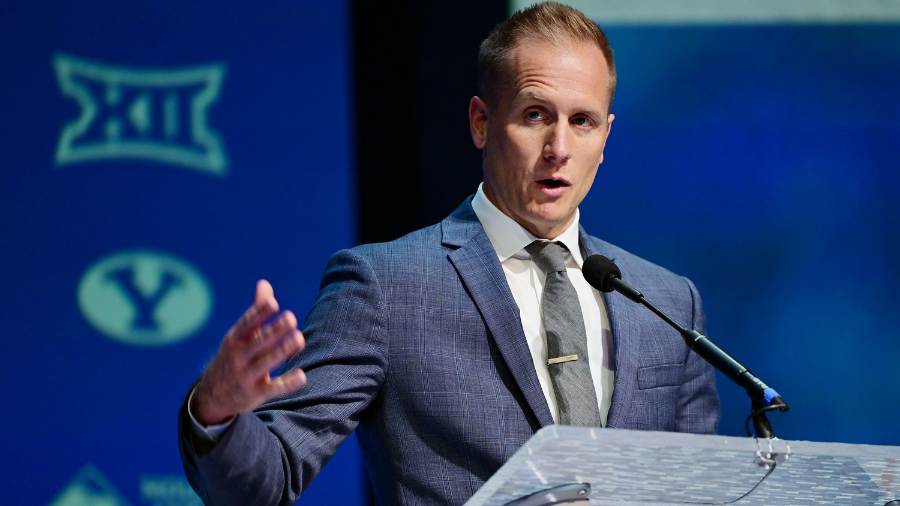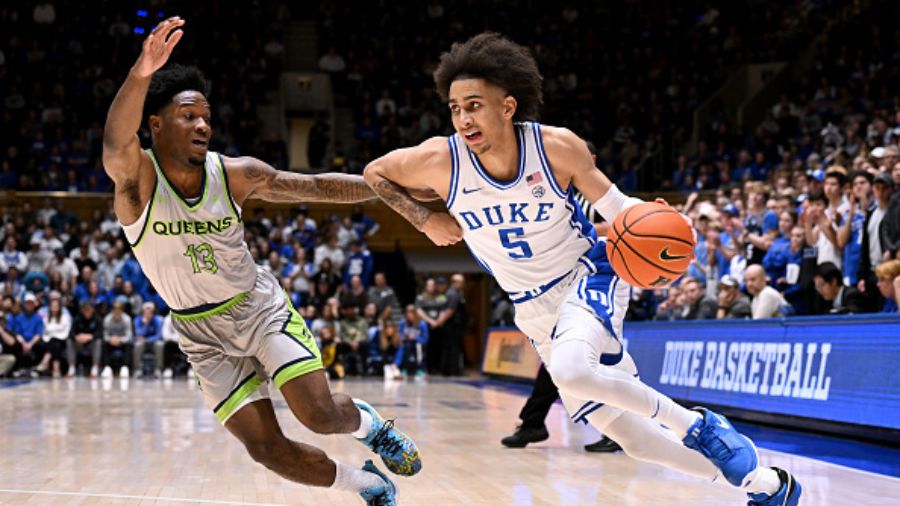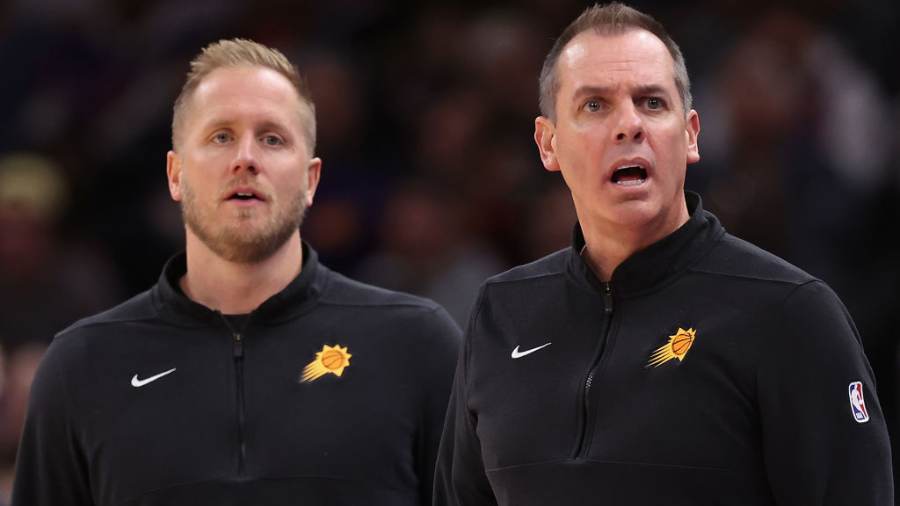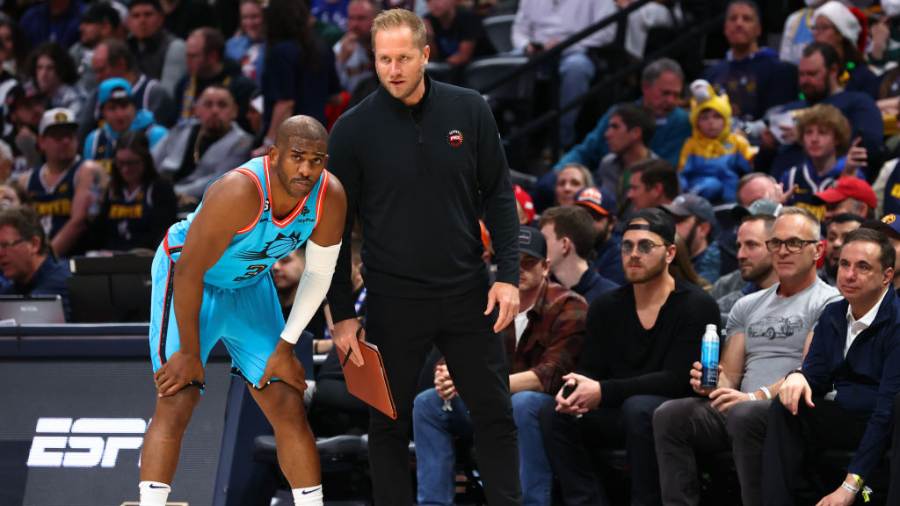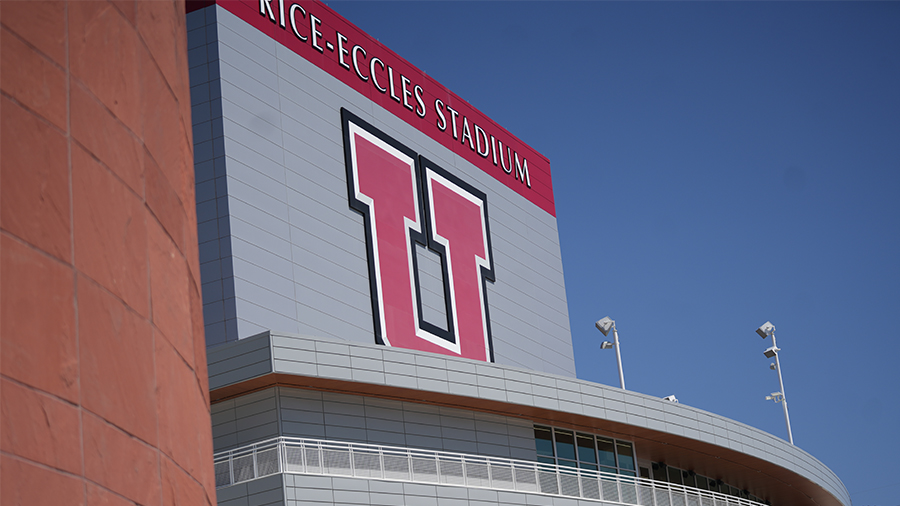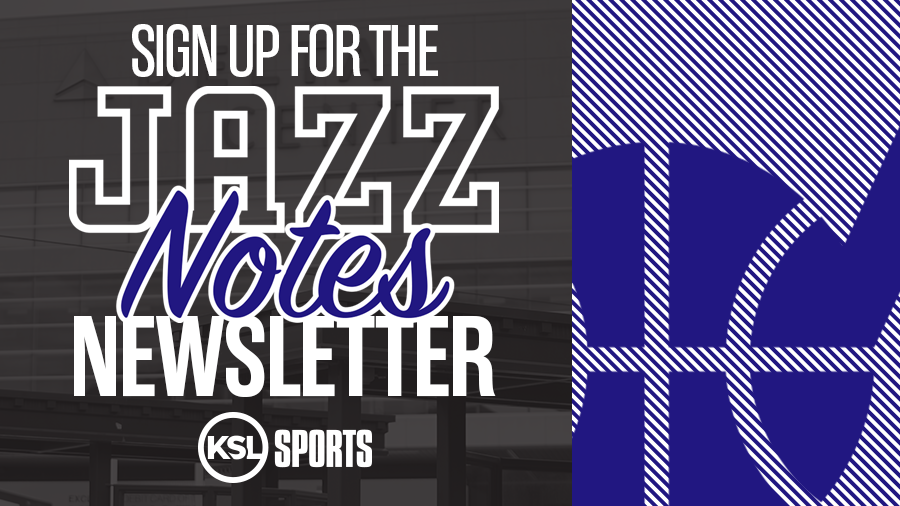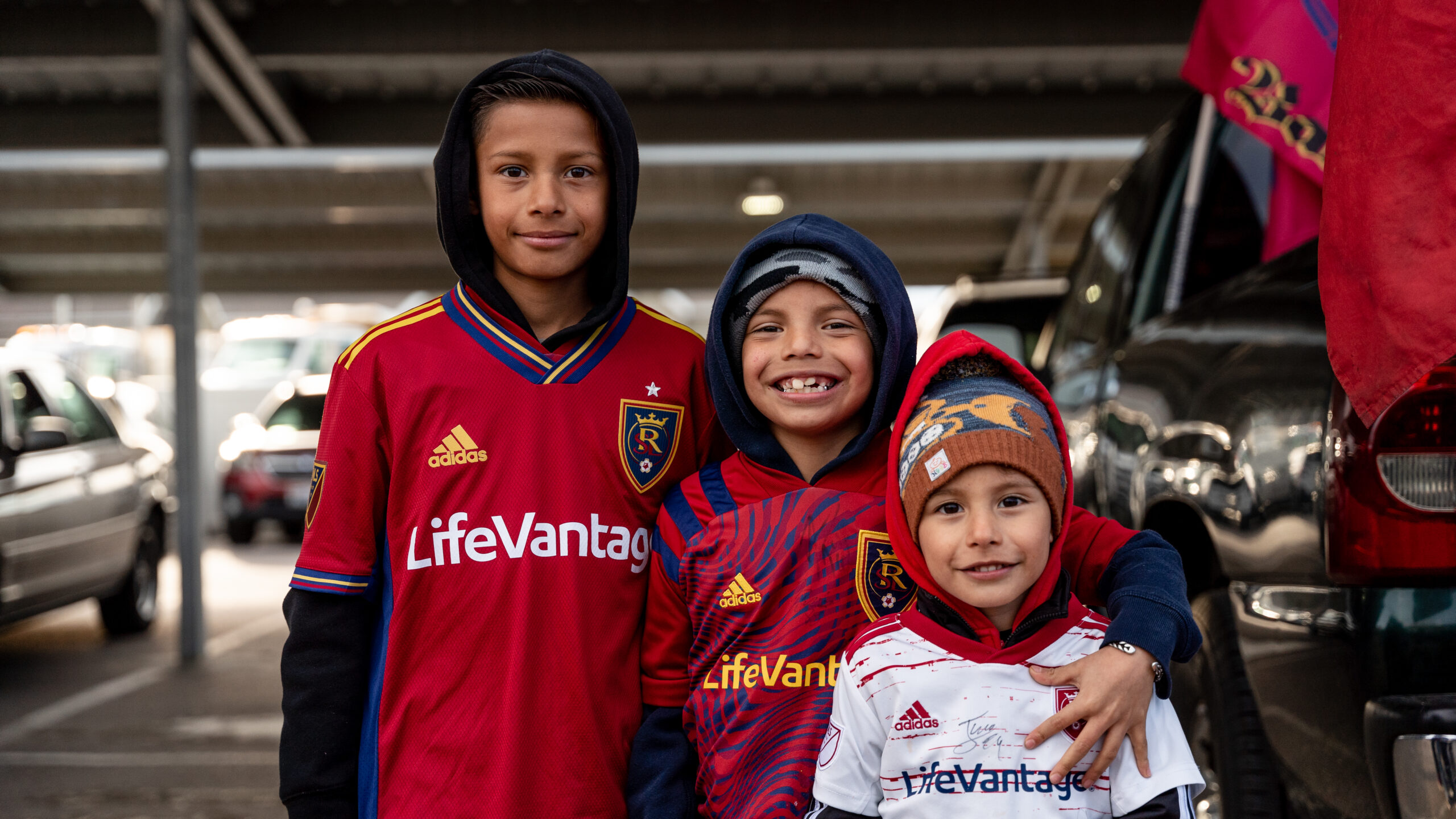Utah Football Alum Keith Embray Building Bridges With Utah Athletics
Mar 9, 2023, 11:53 AM

Keith Embray is Utah's first-ever Executive Director of Equity, Diversity and Inclusion Operations and Associate A.D. for EDI and Student Belonging. Utah is one of three schools with such a position. (Photo courtesy of Utah Athletics)
(Photo courtesy of Utah Athletics)
SALT LAKE CITY – If you were a Utah football fan in the early ’90s you might remember Keith Embray’s name. As of June 2022, Embray has returned home to the Utes in a specially crafted role helping to bridge the gap between the mission of University of Utah itself and it’s “front porch” in Utah Athletics.
Equality, Diversity, and Inclusion have become major buzzwords as of late and have a tendency to shake up a range of emotions in people from very positive to very negative.
As Utah’s Executive Director of Equity, Diversity, and Inclusion Operations/Associate A.D. for EDI and Student Belonging, Embray is tasked with creating and implementing strategies for athletics to insure they are in alignment with the EDI goals of the University. It’s a new role that only a handful of universities and athletics departments have and allows Embray to have tough conversations with student-athletes, coaches, staff and administration throughout Utah’s athletic department.
When Utah decided to create this new position to help bridge their university EDI and athletics worlds, Embray’s name came up almost immediately. Embray admits the recruiting process to bring him home took a while, but he’s so glad to be back and having a positive impact after 13 years away.
Keith Embray was a team captain for @Utah_Football in 1991 and earned second-team All-WAC honors. He played for @Titans in 2000 after earning his Masters from @UUtah, and brings a wealth of experience to his new position. Welcome, Keith! https://t.co/AgrAkd4nF5
— Paul Kirk (@_PaulKirk) May 2, 2022
Coming Back Home
After graduating from Utah in 1992, Embray bounced around a little in the NFL before hanging it up to start fresh in academics at Westminster College running the McNair Scholars program. With a little encouragement from former Utah softball player and current Deputy Athletics Director, Charmelle Green, Embray then turned his attention to working in college athletics. Since then, Embray has spent time at Notre Dame, UCF, and Penn State mostly working in student-athlete development before Green, Athletic Director Mark Harlan, and Vice President of EDI Dr. Mary Ann Villareal came knocking.
At the end of Black History Month, Liv Jack (Penn State Swim Team) thanks her mentors who helped her throughout her swim career.
Keith Embray (@UUtah Executive Director EDI/Associate Athletics Director) was one who helped her feel a sense of belonging.https://t.co/6fJ5N0PvCr— University of Utah Equity, Diversity, & Inclusion (@uofuedi) March 1, 2023
Harlan had reached out to Embray prior due to his relationship with Coach Mac and his wife Vicky from their shared time at Arizona. Harlan and Embray’s initial conversation took place right before the pandemic hit and they continued to stay in touch with the hopes of the “perfect fit” coming about. That is where Green entered the picture again to work with Dr. Villareal with Harlan’s blessing to craft what would become Embray’s position.
“Mark Harlan has an unapologetic love and respect for coach Mac” Embray said. “Coach Mac got him his first start in athletics working at U of A. He was like the manager, graduate assistant guy. Slept on Mac’s couch. Harlan told me, when coach Mac refers to me as ‘one of the most special kids he’s ever coached’- Mark knows he coached a lot of guys so for him and Ms. Mac- Vicky, to say that to him, ‘hmmm, I better meet this guy’.”
The next step in convincing Embray that coming back to Utah was the move, was proving this position wasn’t performative. Embray says he needed to know that the school and athletics department were serious about making actionable moves in an effort to be more equitable, diverse, and inclusive.
At the Marriott Center in Provo with @utahathletics @MarkHarlan_AD and @charmelle44 cheering on @UTAHWBB. Let’s #GoUtes! pic.twitter.com/LXL2afZP0V
— Taylor Randall, UofU President (@PresidentUofU) December 11, 2022
“The thing they all convinced me of was giving this thing some teeth,” Embray said of his recruitment team. “When I think about President Randall and his initiatives and things that are important to him- we want to be imaginative, innovative, and impactful. That’s what they wanted in this position and why they created it the way that they did. Sometimes you see a lot of things- I call it performative optics. ‘Hey, it’s Black History Month and here is the shirt that they wear.’ Ok, but are we actually talking about it? Do we know why it’s in February?”
(For those who are curious- In 1926 Dr. Wilson chose February for Negro History week because of the birthdays of Frederick Douglas and Abraham Lincoln. In 1976 it shifted from a week, to what we now know as Black History Month. Gerald Ford was the first president to officially recognize Black History Month.)
Building Bridges, Not Walls
Embray’s position with the Utes is one of only three like it with the dual designation between the university and athletics. Embray feels like his experience as a student-athlete, working in athletics and being a professor has prepared him to take on a role that is very different.
“I guess I’m one of a handful of people who can walk in both of those worlds because I do understand the university side. My time at Westminster College taught me a lot and then just in my position to bring resources to student-athletes. I’ve always had a connection with university resources on every campus I’ve been at in helping to dispel myths cuz athletics has them, the university has them and then I’m that person who is the bridge, the conduit between the two.”
Embray realizes the importance of having the athletics department and student-athletes on the same page as the university in terms of being an equitable, diverse and inclusive place because of being one of the most forward-facing aspects of the college experience.
@UTAHWBB begins its historic Pac-12/SWAC Legacy Series in Mississippi
"Not to take anything away from the game, but it’s about much more than what happens on the court. This is about building bridges.” ~Keith Embray
🖥️ https://t.co/P6NKNzqH04@UUtah pic.twitter.com/6IHrg4srZz
— University of Utah Equity, Diversity, & Inclusion (@uofuedi) December 12, 2022
“If we are in alignment with the university’s equity, diversity and inclusion goals- athletics typically is the front porch for the college or university and it’s profile,” Embray said. “If we do it, nobody else has an excuse not to.”
Part of the challenge Embray faces daily in being the bridge and conduit for better equity, diversity, and inclusion at Utah is the response people can often have to what is a very difficult conversation. Embray was so aware of this that he actually originally didn’t want to have EDI in his title in a effort to help open up some of the more reluctant participants. Green and Dr. Villareal convinced him otherwise.
“Just learning how to have these conversations around these things and not be polarizing- that can be difficult,” Embray said. “The truth is the truth. My grandpa would always say, we are either talking about how you feel or we’re talking about what is real. Feelings are real, but then how do you have these conversations to where people don’t shutdown and instead open up and want to engage more? That’s difficult. There is the reality of things- history and then there is the world we have to live in and navigate. There is that balance which is why this work can be difficult and exhausting.”
The Fern, The Cactus, And The Rosebush
Another aspect of Embray’s job that is challenging is trying to get people to understand exactly what it means to be equitable, diverse, and inclusive because too often those words are mistaken as the same thing, but they are very different.
“What does it mean to be equitable? What does it mean to be diverse? What does it mean to be inclusive? Unfortunately, we use a lot of those terms interchangeably and they don’t mean the same thing,” Embray said. “They work in conjunction, but they don’t mean the same thing.”
🪴🌵🌹
Tackling another big topic through the scope of sports.#GoUtes #UteProud pic.twitter.com/trYqlOo0fJ
— Michelle Bodkin (@BodkinKSLsports) February 23, 2023
Embray gave an easy illustration of what equality versus equity is using a fern, cactus, and rosebush. Embray admits there is a lot of confusion that surrounds what those two words mean, and why understanding they accomplish very different things is important.
“The problem is if you give them all the same (equality)- they all have different requirements (equity). The cactus doesn’t need the same amount of water as the fern does. The rose needs more than say the fern does. When we talk about equity, it’s about giving people what they need in order to grow and be successful. It’s not giving everybody the same because everybody doesn’t need the same things. You could have actually taken the water from the cactus and given it to the fern. Give more light to the cactus. You’re getting them what they need. That’s what equity is truly about.”
Travel Agents, And Tour Guides
Embray has a lot of people in his life he’s taken inspiration from and credits for helping him to be able to navigate such a tricky, but important job. Whether it’s his mother, uncles, grandparents, Brenda Yamagata, coaches Ron McBride, Fred Graves, Sam Papalii, Kyle Whittingham and his late father Fred, or on the academic side Dr. Ronald Coleman, Dr. Larry Gerlach, Dr. William Smith and Dr. Teresa Martinez, or spiritually with Reverend France Davis, Embray has a host of “travel agents and tour guides” he’s been able to tap into.
Currently meeting with Salt Lake City Police Chief, Mike Brown, Mayor Mendenhall, and leaders of the African American community. Including Coach Ron McBride. pic.twitter.com/Ifgh6N00oZ
— Kamaal S. Ahmad (@CoachKAhmad) June 2, 2020
“I learned in life we have travel agents and tour guides,” Embray said. “This is a thing we taught while I was at Penn State to student-athletes about mentorship. Travel agents tell us how to get there, where to go, book the flight for you- everything else. A tour guide will actually work with you or walks with you. When you think about what mentorship looks like- they are travel agents and tour guides and we are all capable of being mentors.”
So Why So Much Emphasis On EDI Through Athletics?
There are a few things at work that make sports an ideal place to have conversations surrounding EDI. From generally collecting a group of individuals from all different backgrounds that have to work together despite their differences, to often being the first to break down barriers based off of race or sex, sports tend to make an environment where examples can be set and Embray has a theory as to why.
“Athletics is still one of the few things where you can see the real person,” Embray said of sports’ importance in EDI. “What I mean by that is, you see the real person either when you’re sick, tired, or injured and you’re not capable of being fake. We can work in an office, in a cubicle next to somebody and really not know who they are because we’ve never seen them deal with adversity. When you deal with adversity, you deal with the real person. That’s what builds those natural bonds and it’s the same thing that is forged in the military. That’s why athletics is based off of the military model.”
Thank you Keith Embray for speaking with us today as we prepare to head to Itta Bena, Mississippi to be apart of the Pac-12 and SWAC Legacy Series to play Mississippi Valley State. #GoUtes | #BelieveIt pic.twitter.com/WmC0bv2OKi
— Utah Women’s Basketball (@UTAHWBB) November 29, 2022
“That’s what makes room to have conversations about differences,” Embray continued. “Differences in how we see the world, differences in how we walk this world, but we are afforded that room because we’ve gone through that adversity and challenge together. If I truly care for you, truly love you that means I’m capable of listening to you.”
The Rearview Mirror Is Smaller Than The Windshield For A Reason
The Utes just finished up celebrating Black History Month in February and will now be turning their attention to Women’s History Month through March. Embray notes that celebrating these months that highlight various contributions from minority and marginalized groups is important not just for the individuals it affects, but for our overall understanding of what makes us, us.
“This isn’t African American History Month, or Pride Month- these are part of American history, heritage, and culture, but until we get to a place where we feel like we can combine them and we should combine them- then yeah, we’ll require a month or a week or a day to remind us of where we’ve come from, where we are, and where we need to go,” Embray said.
𝐁𝐞 𝐒𝐞𝐞𝐧. 𝐁𝐞 𝐇𝐞𝐚𝐫𝐝. 𝐁𝐞 𝐂𝐞𝐥𝐞𝐛𝐫𝐚𝐭𝐞𝐝.
A closer look at what our guys will be wearing tonight from the @UAbasketball #BlackHistoryMonth Collection.#GoUtes | #UtahBHM pic.twitter.com/qq3mH26qgJ
— Utah Basketball (@UtahMBB) February 23, 2023
“The rearview mirror is smaller than the windshield for a reason,” Embray continued. “We need to be able to know where we came from, what came before us, but if we are constantly looking back, we have a tendency to miss all of the things right in front of us. That’s why the windshield is bigger than the rearview mirror for a reason. We need to remember what happened to us, but we need to keep our eyes forward because we will potentially miss all the opportunities and not just challenges in front of us.”
The Hard Conversations
Embray knows all too well how hard conversations surrounding equity, diversity and inclusion can be. It’s not for the faint of heart and certainly takes a level of humility from all parties to accomplish. For anyone looking to be a part of these conversations and part of the solution, Embray suggests the number one thing you have to do is realize it’s not about you.
“That’s the hardest one,” Embray said. “I’m even talking about myself. It’s not about me, my personal journey, my personal experiences in order to broker a conversation. We have to be willing to meet people where they are as opposed to where we want them to be. I think a lot of folks go into things thinking someone should already be at a certain point. You should already know this; you should already understand this. When that doesn’t line up, all of the sudden communication shuts down- you’re hearing, not listening.”
Being able to sit back, listen, and absorb what you’re being told is another important key to brokering successful conversations around EDI.
Keith Embray is an alum of the University of Utah who has recently returned in a dual capacity with EDI and Athletics. Get to know Keith and his goals for student belonging at the U.
Full interview: https://t.co/P6NKNzrePC@UUtah @utahathletics pic.twitter.com/V2RJ2Vp2Um
— University of Utah Equity, Diversity, & Inclusion (@uofuedi) October 10, 2022
“Listening is a conscious act to focus,” Embray said. “Hearing is a physical one. I hear a sound. Doesn’t mean I’m focused on it. When you create these bonds, you create these spaces of people willing to listen and not just hear each other. That’s because we have these shared experiences, shared adversities and if I genuinely care about you and love you, how could I not be willing to listen?”
Understanding the privilege you bring to the table is one more piece of the conversation that can be tough. There isn’t a single person without some kind of privilege, just like there isn’t a single person without biases either.
“If you don’t believe you have privilege, that’s part of the problem,” Embray said. “‘I don’t have privilege, I grew up poor, I’m White.’ There are still things you benefit from that you never had to ask for. American Express had the saying ‘membership has privileges’- so membership because of its privileges, if you aren’t a member, where does that leave the non-members? That’s what makes these conversations difficult at times too, because when you realize the privileges you have and some of the biases you have, what are you then doing with it?”
Once someone has taken the time to understand their privileges and biases along with remembering not everything is about them while also taking the time to actively listen, it becomes time to put everything into actions. This then brings up the problem of empathy versus apathy and being an advocate for change rather than just an ally.
“Nobody likes to feel like they aren’t empathetic,” Embray said. “We don’t want to admit we are maybe a little more apathetic than we are empathetic. We advertise the empathy piece. However, if you don’t have a frame of reference, it doesn’t affect your day-to-day and maybe you believe it isn’t right, but it doesn’t impact you- that’s apathy. Doesn’t mean you are devoid of feelings and emotions of right and wrong, but you aren’t moved to real action on something because it’s not your day-to-day.”
Bigger than basketball.
What an incredible experience this past week at the Pac-12/SWAC Legacy Series 🙌 #Pac12SWAC | @pac12 @ValleyStateWBB pic.twitter.com/ZD87yDWBHe
— Utah Women’s Basketball (@UTAHWBB) December 7, 2022
“As an ally you believe something is right and you want to be a part of it and support it, whereas advocates personally and publicly are speaking and challenging things within and outside their sphere of influence,” Embray continued. “That’s not to dismiss ally-ship, we need allies in this work, but we also need allies to move to advocacy. Empathy and awareness are critical first steps, but action and courage are required to produce tangible change and growth in people and systems. It’s talking the talk and walking the walk.”
Making Sure People Are Seen, Heard, And Valued
One of the easiest pieces of action one can take every day to be more equitable, diverse, and inclusive is to make sure the people around you know you see them, you hear them, and you value them. End of the day, that is the ultimate point of emphasis Embray, the University of Utah, and Utah Athletics are trying to drive home to their students, student-athletes, coaches, faculty, and staff.
“I know at the core of this work between Dr. Villarreal, Charmelle and Mark we’re trying to ensure people are seen, they are heard, and that they know they are valued,” Embray said. “You can call it equity, diversity, and inclusion. You can call it whatever, but at the end of the day, people want to be seen, they want to be heard, and they want to be valued for who they are. That’s at the core of why I took this position.”
𝐒𝐧𝐞𝐚𝐤 𝐩𝐞𝐚𝐤 𝐟𝐨𝐫 𝐭𝐨𝐦𝐨𝐫𝐫𝐨𝐰’𝐬 𝐠𝐚𝐦𝐞 👀😤#GoUtes pic.twitter.com/WG11XYUZHp
— Utah Women’s Basketball (@UTAHWBB) February 22, 2023
“I’ve walked this campus as a student of color and I know what it’s like to sit in a class, to walk the campus, to participate in a community and wonder if someone saw me today,” Embray continued. “With my student-athletes, one of my biggest pet-peeves is if you see someone, acknowledge them because you don’t know what their day has been like and you could be the first person to acknowledge, ‘hey, I see you’. It costs nothing to acknowledge someone’s presence and gains you everything in building relationships.”
Michelle Bodkin is the Utah Utes Insider for KSLsports.com and host of both the Crimson Corner Podcast (SUBSCRIBE) and The Saturday Show (Saturday from 10 a.m.–12 p.m.) on The KSL Sports Zone. Follow her on Twitter and Instagram: @BodkinKSLsports

